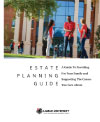Tuesday April 16, 2024
Case of the Week
Lucky Lucy Lindstrom's "No Self-Dealing" Charity
Case:
Lucky Lucy Lindstrom finished college and headed west. She started as a financial analyst with a large company in Seattle. After just four years, she became a Registered Investment Advisor (RIA) and began advising clients. Lucy also managed her own investments. With her keen insight into financial markets, Lucy soon began to move from traditional stocks and bonds into futures and commodities markets. Lucy was so successful in these markets that she now only manages her own large personal portfolio.Somewhat late in life, Lucy discovered the wonderful world of philanthropy. She volunteered at her favorite charity and learned that giving someone in need a helping hand is even more gratifying than making another million in the futures market. Lucy had invested $1,000,000 in a "penny stock" company. Recently, the stock rose from the $1 per share that she paid to over $5 per share. Lucy was delighted with her gain and decided to give the $5,000,000 in stock to a charitable foundation to help those in need.
Lucy discussed several options with her attorney and her favorite charity. One of the options that Lucy was very interested in was a private foundation (PF). She asked her attorney for reasons to select a private foundation. Her attorney noted that private foundations are more expensive to operate, appreciated gifts are deductible only to 20% of AGI, deductions for gifts of real estate to a PF are limited to basis, there is usually a 2% excise tax on investment income and the PF is subject to various rules on self-dealing, minimum distributions and excess business holdings. However, a private foundation would give Lucy full control.
Question:
Lucy said, "Wow! There are a lot of negatives about private foundations. So why set up a private foundation? If I fund a private foundation, can I manage the investments and receive my normal RIA payments from the foundation?"Solution:
Her attorney noted that private foundations are subject to the Sec. 4941 self-dealing rules. There is an exception for payment of compensation by a private foundation to donors, family members and other disqualified persons. Under the exception, the personal services from the disqualified person must be reasonable and necessary in carrying out the purpose of the private foundation and the compensation must not be excessive. The disqualified person should hold the requisite knowledge and expertise to perform the personal service.The services of a Registered Investment Advisor are necessary for the Foundation. Lucy's proposed level of compensation is reasonable and comparable to that received by other individuals in similar circumstances. Thus, Lucy's counsel advises that the Sec. 4941(d)(2)(E) exception will apply and compensation to Lucy will be permitted.
However, her attorney suggests that there is no need to run any risk with Lucy's private foundation. Lucy does not need added income and the foundation fees would have been a small part of her annual income. Therefore, Lucy decides to provide the portfolio management services to the Lindstrom Foundation without compensation.
Previous Articles
Lucky Lucy Lindstrom's "Ultimate Control" Charity
Lucky Lucy Lindstrom's "Lucky Penny LLC"
Lucky Lucy Lindstrom's "Personal Loan" Charity






